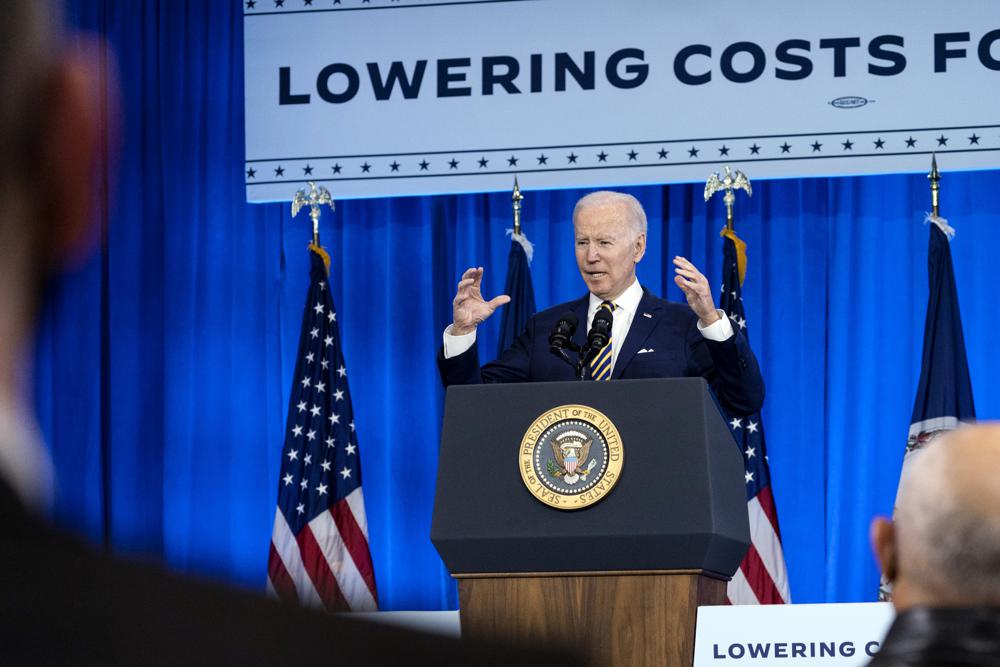
WASHINGTON — President Joe Biden came into office with a plan to fix inflation — just not the particular inflationary problem that the country now faces.
His belief is that a cluster of companies control too many industries, which reduces competition for both customers and workers. That leads to higher prices and lower wages in what the White House says is an average cost of $5,000 annually for U.S. families. Biden is now trying to remedy the situation with 72 distinct initiatives — everything from new rules for cell phone repairs to regulations on meatpacking to more merger reviews.
“The dynamics of the modern American economy — the increased consolidation and lack of competition — has distorted market incentives in important ways,” said Brian Deese, director of the White House National Economic Council. “The president gave us the direction that he wanted us to come back and say what could we do to address this issue of consolidation across industries in a way that would be durable.”
But even administration officials acknowledge that the initiatives outlined by the president’s seven-month-old competition council aren’t designed to quickly stop the 7.5% inflation that’s frustrating Americans and damaging Biden’s popularity. Furthermore, business groups dispute the fundamental premise that competition has faded within the U.S. economy and they are prepared to challenge the administration’s new initiatives in court.
“It will strangle economic growth,” said Neil Bradley, executive vice president and chief policy officer of the U.S. Chamber of Commerce. “Ironically, what this will do is actually lead to more inflation.”
Part of Biden’s dilemma is that reorienting a bureaucracy to promote competition takes time, and voters want to see inflation — running at a 40-year peak— start dropping now. Voters feel the bite of inflation with every trip they make to the grocery store or the gas station, yet the president is traveling the country to discuss solutions such as competition and new infrastructure that predate the current predicament and would have a much more gradual impact.
America’s current inflation woes stem from the pandemic. Supply chains for computer chips, clothes, furniture and other goods are under stress. At the same time, consumer demand has surged after a historical amount of government aid flowed into the economy. Despite efforts to get the kinks out of the supply chain, price increases have stayed high in recent months instead of fading as many initial forecasts suggested. That has the Federal Reserve ready to increase interest rates to lower inflation.
In a January survey by the University of Chicago, two-thirds of leading economists said that the concentrated power of companies does not explain the current rash of inflation.
New York University economist Thomas Philippon has welcomed the administration’s approach — while allowing it would do little to bring down prices. As the author of the 2019 book, “The Great Reversal: How America Gave Up on Free Markets,” Philippon is the source of the administration’s statement that market concentration places a $5,000 drag on an average family.
What Philippon observed was that other nations had embraced a level of antitrust enforcement and competition that no longer exists in America, resulting in lower costs for cell phone service, internet and airline tickets in Europe relative to the U.S.
“As a way to fight current inflation, it is unlikely to have a big impact in the short term, but it can still be useful,” Philippon said. “I think of it more as a positive side effect of something that should be done in any case.”
The Biden administration contends that even if the lack of competition didn’t directly trigger the recent spike in prices, it has contributed to inflation. The White House Council of Economic Advisers blogged in July about how more sectors of the economy are effectively controlled by a smaller number of companies.
It cited studies that show how mergers led to higher prices for hospital services, health insurance, airline tickets and beer. It also documented a decline in government reviews of mergers and noted that the 2020 federal lawsuits against Google and, separately, Facebook were the first major monopolization cases in 22 years.
After the second meeting of the government-wide competition council in late January, the White House charted its progress. The Food and Drug Administration has proposed selling hearing aids over-the-counter, “lowering their cost from thousands of dollars to hundreds of dollars,” according to a White House statement. The Federal Trade Commission will increase enforcement against restrictions that companies place on people repairing their own electronic devices. The Transportation Department figures it can cut prices of airline tickets in the New York City area by opening up 16 slots to a low-cost carrier at the airport in Newark, New Jersey.



